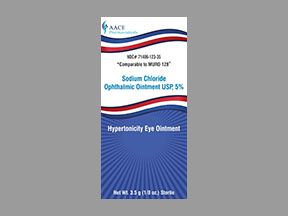
Sodium Chloride (hypertonic) Coupons & Savings Card – Discount Prices from $14.69
Generic for: Muro 128, Altachlore, Cvs sodium chloride
My prescription
Edit
3.5GM of 5%, Sodium Chloride (hypertonic) (1 Tube)
Select pharmacy

Walgreens
$14.69
COUPON PRICE
Walmart
$23.75
COUPON PRICE
Albertsons
$24.96
COUPON PRICESodium Chloride (hypertonic) savings card
Show this card to your pharmacist
Walgreens
$14.69
BIN
ID
PCN
GRP
015995
LHKPY246223
GDC
DR33
Powered by
More prescriptions for edema
More prescriptions for edema
Price history for Muro 128 (brand) & Sodium Chloride (hypertonic) (generic)
1 Tube, 3.5GM of 5%
Average retail price for Muro 128
Average retail price for Sodium Chloride (hypertonic)
Average SaveHealth price for Sodium Chloride (hypertonic)
Our price history data is based on aggregated prescription data collected from participating pharmacies in America. Our prescription data updates daily to reflect the latest price changes. If you notice a missing data point, it means there wasn't sufficient data available to generate a monetary value for that date.
We analyzed Sodium Chloride (hypertonic) prices for (3.5GM of 5%, 1 Tube) over the last 12 months. The average retail price was $55.27, while the average price using the SaveHealth discount card was $7.35. That's a savings of approximately 86.70% when using our Sodium Chloride (hypertonic) coupon.
Compared to the generic version, Muro 128 had an average price of $31.77 over the same time period. With the SaveHealth savings card, Sodium Chloride (hypertonic) is 76.86% cheaper on average than Muro 128.
*Retail prices are based on pharmacy claims data, and may not be accurate when we don't have enough claims.
Sodium Chloride (hypertonic) dosage forms
Dosage Quantity Price from Per unit 3.5GM of 5% 1 Tube $18.38 $18.38 3.5GM of 5% 2 Tubes $27.76 $13.88 3.5GM of 5% 3 Tubes $37.14 $12.38
| Dosage | Quantity | Price from | Per unit |
|---|---|---|---|
| 3.5GM of 5% | 1 Tube | $18.38 | $18.38 |
| 3.5GM of 5% | 2 Tubes | $27.76 | $13.88 |
| 3.5GM of 5% | 3 Tubes | $37.14 | $12.38 |
